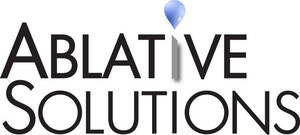KALAMAZOO, MI and KATOWICE, Poland, Oct. 14, 2014 /PRNewswire/ -- Ablative Solutions, Inc. (ASI), a privately held company headquartered in Kalamazoo, MI, with offices in Menlo Park, CA, announced today that it has treated the first patient in the Peregrine Study. Patients enrolled in the study receive targeted therapy using the investigational Peregrine System™ Infusion Catheter to treat sympathetic nerves located in the outer region of arteries. The interruption of these nerve pathways may have therapeutic implications for a number of diseases and conditions, including hypertension, metabolic syndrome, congestive heart failure and obesity.
The Peregrine Study is currently enrolling patients at two of the hospitals in The American Heart of Poland Group (AHP). Prof. Pawel Buszman, head of AHP, said, "Part of the AHP charter is to advance therapy for our patients through active engagement in clinical research. We are pleased to be on the forefront in evaluating the third generation of device-based therapy to address the treatment of severe hypertension. This is a significant health issue in Poland and throughout Europe, since many patients face serious health complications because they have limited options to manage their hypertension." Prof. Wojtek Wojakowski is the Principal Investigator of the study. The patient has been discharged from the hospital.
The Peregrine System can be used to deliver agents directly to the sympathetic-nerve-laden peri-adventitial area of the renal artery to perform Chemical Neurolysis. Tim Fischell, MD and CEO of ASI said, "We are very pleased to have initiated the Peregrine Study. We believe that a safe, reproducible, easy to use and more targeted denervation technology with limited pain to the patients will be more effective than energy-based catheter approaches in mitigating overactive sympathetic nerves. Early experience with surgical sympathectomy has demonstrated that effective interruption of these nerves had a beneficial effect on blood pressure. We hope that Chemical Neurolysis will provide a minimally invasive approach that builds upon some of the early successes of renal denervation, while avoiding many of pitfalls encountered by energy-based systems."
The Peregrine Study will be expanded to other European clinical sites to secure CE-mark and to enable additional cardiologists to evaluate Chemical Neurolysis using the Peregrine System in their patients suffering from hypertension.
This press release does not constitute an offer to sell or the solicitation of an offer to buy any securities in an ASI stock offering. There will not be any sale of these securities in any state or jurisdiction in which such offering, sale or solicitation would be unlawful prior to registration or qualification under the securities laws of any such state or jurisdiction.
Forward-Looking Statements
Statements made in this press release that look forward in time or that express expectations regarding future occurrences or anticipated outcomes or benefits are forward-looking statements. A number of risks and uncertainties, such as risks associated with product development and commercialization efforts, results of clinical trials, ultimate clinical outcomes and market acceptance of the Company's products to patients, intellectual property protection, and competitive product offerings, could cause actual events to differ from the expectations indicated in these forward-looking statements. As a result, you are cautioned not to put any undue reliance on any forward-looking statement. Except as required by law, the Company assumes no obligation to update the forward-looking statements, which are made as of the date hereof, even if new information becomes available in the future.
For more information:
Vartan Ghazarossian, PhD
President
(650) 321-6884
http://www.ablativesolutions.com
Logo - http://photos.prnewswire.com/prnh/20141014/151921LOGO
SOURCE Ablative Solutions, Inc.
Related Links
WANT YOUR COMPANY'S NEWS FEATURED ON PRNEWSWIRE.COM?
Newsrooms &
Influencers
Digital Media
Outlets
Journalists
Opted In





Share this article